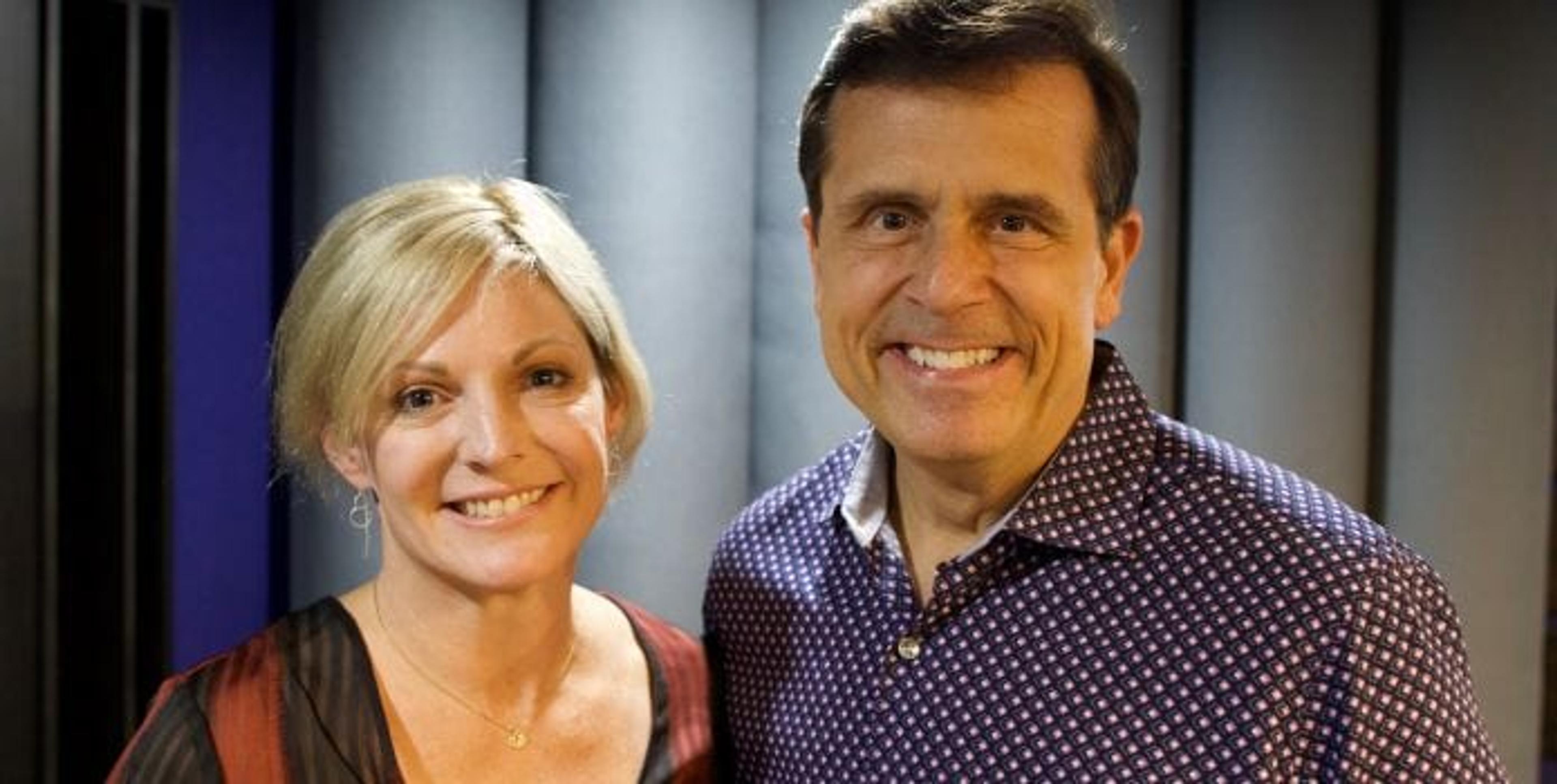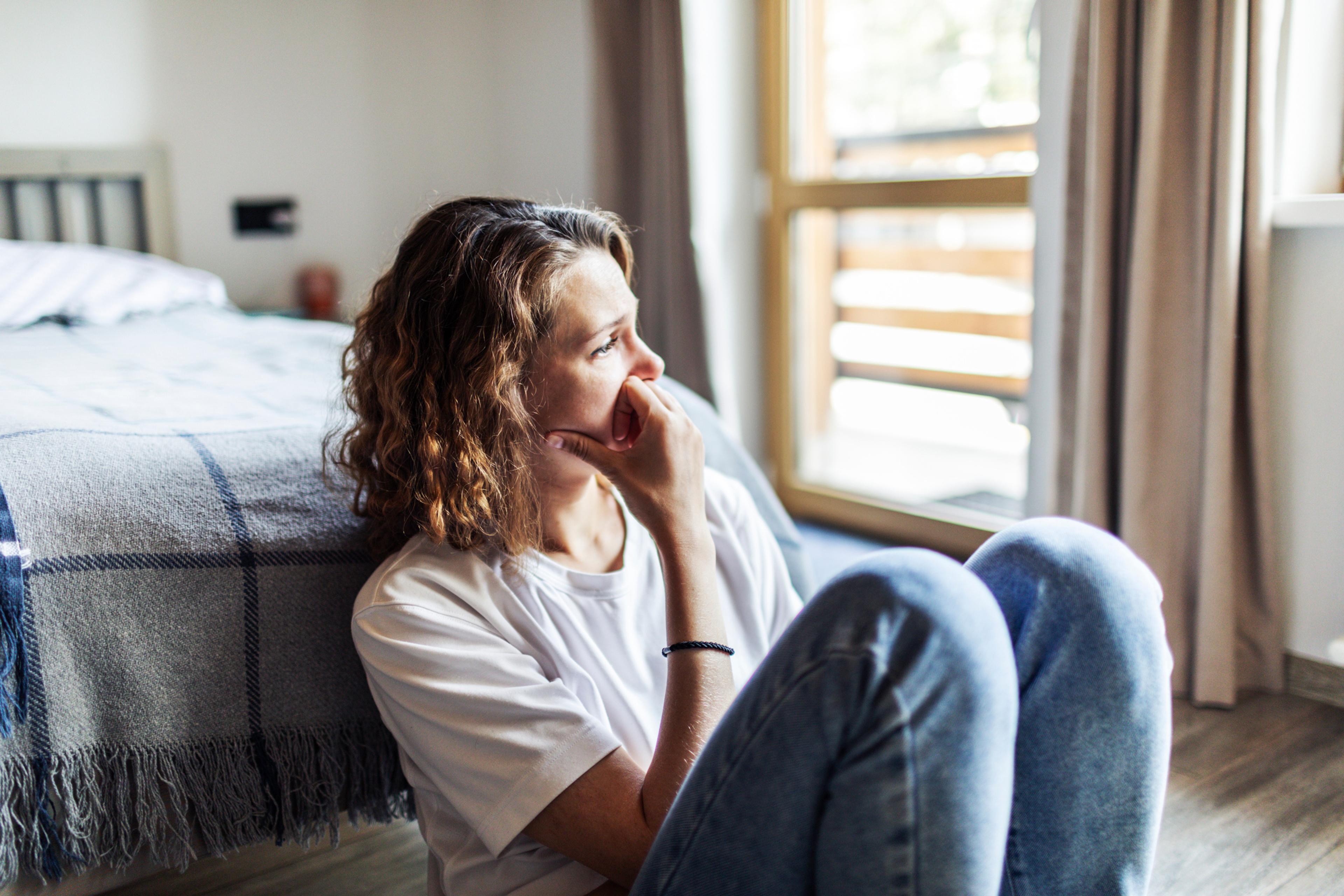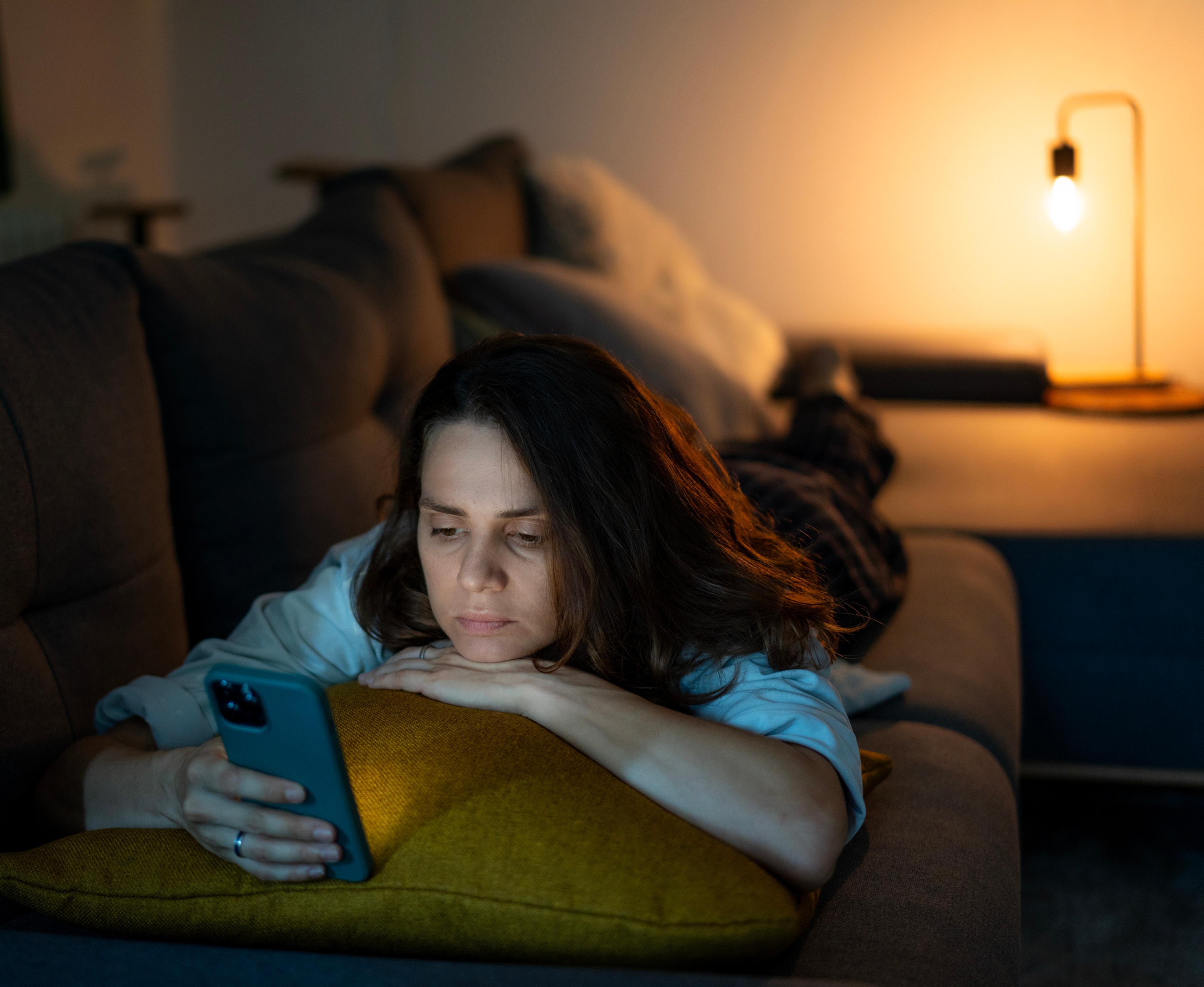Effects of Social Media on Teens
| 1 min read

00:00
00:00
About the Show
On this episode, Chuck Gaidica is joined by Dr. Kristyn Gregory, a medical director of behavioral health at Blue Care Network of Michigan and Blue Cross Blue Shield of Michigan. Together, they discuss social media and its effect on children’s mental health.
“It can lead to a lot of anxieties if somebody doesn’t return your text message right away or they not let you know where they’re located in the world. It can also lead to anxiety that you’re missing out, this whole fear of missing out. If I’m not attached to the social media at all times, what am I missing? What are the other kids doing?” – Dr. Kristyn Gregory
In this episode of A Healthier Michigan Podcast, we explore:
- How social media is the new normal
- Anxiety and FOMO
- The permanence of the internet
- Setting boundaries and monitoring usage
- Red flags and notable behavioral changes
- The dangers of sharing passwords
- The rise of cyberbullying and how to prevent it
- Tips on where to seek help
Transcript
Chuck: This is A Healthier Michigan Podcast, episode 29. Coming up, we discuss the effects of social media on adolescents.
Chuck: Welcome to A Healthier Michigan Podcast, the podcast dedicated to navigating how we can improve our health and well-being through small healthy habits we can start implementing right now.
Chuck: I’m your host, Chuck Gadica. Every other week, we’ll sit down with a certified health expert from Blue Cross Blue Shield of Michigan to do a deep dive into topics covering nutrition, fitness, and now today social media and a whole lot more.
Chuck: On this episode, we’re talking about social media. With me today, Dr. Kristyn Gregory. She’s a Medical Director of Behavioral Health at Blue Care Network of Michigan and Blue Cross Blue Shield of Michigan.
Chuck: Dr. Gregory received her medical degree from Chicago School of Osteopathic Medicine. She also completed residency training in adult psychiatry at Henry Ford and had a fellowship in child and adolescent psychiatry at Wayne State University. There are so many big words to throw at me this early in the day.
Chuck: She’s board-certified in adult, child, and adolescent psychiatry, previously practiced in a variety of settings in the Metro Detroit Area, including inpatient, residential, outpatient, and juvenile justice programs. She’s had a private practice where she treated children and adults with a variety of mental health issues, as well as consults for local school districts. It’s good to see you.
Dr. Gregory: You too, Chuck.
Chuck: Nice to have you with us. Here we are. Isn’t it ironic? We’re talking about how social media can affect adolescents, our kids. You’ve got two kids.
Dr. Gregory: Right. Two kids.
Chuck: I’ve got five. Now my kids are starting to have kids. I’m well aware of what’s shifting right before my eyes generationally. But we’re talking about it while we are also embracing social media, right?
Dr. Gregory: Right. Exactly, yeah.
Chuck: Isn’t that funny?
Dr. Gregory: The irony of it.
Chuck: Yeah. There’s good and bad to it, right?
Dr. Gregory: Yeah. Nothing is all good or all bad. I think there’s definitely good parts of social media that we can use, but there’s cautions as well.
Chuck: This allows us for our ability now to stay not just connected, but hyper-connected. You were giving me an example while you were on spring break last month. I mean here we are, the April showers have brought May flowers, so we’re farther down the road. But tell us a little bit about that, because you are able to peek in on where your friends are, right?
Dr. Gregory: Yeah. In social media, my daughter, she was peeking in, I think it was on Snapchat, about where her friends were all over the country. She could see where everybody else was on spring break. She was in Florida, whereas other people were in Europe or Bali, all around the world.
Dr. Gregory: But it’s that real-time constant connection. No matter it’d be 11:00 at night or 11:00 in the morning, you always are connected. Kids now really, they strive for that. They fear that they’re going to miss out on something if they’re not always checking.
Chuck: For your daughter, and I guess it may be different than for the world at large, checking in on somebody in Bali, as nice as Florida is. Somebody’s in Bali and somebody’s in Europe. Is she reveling in that, like, “Whoa! Way to go to. Look at where my friends are,” or is that giving her a wah wah wah kind of day?
Dr. Gregory: Yeah, I mean sometimes she’d be like, “Wow! I wish we were in Bali.” I’d say, “I wish we were, too.”
Chuck: Right. We all wish we were in Bali at times. Let’s talk a little bit about this idea of social media in the sense of how fast this has progressed right before our eyes, and some of our kids are only 10 years old, I mean on top of it, right?
Dr. Gregory: Right. Exactly, yeah. 10-year-olds have cellphones and access to this at all times, like you were saying that your phone, that’s your wallet. It’s always with you. You’ve got your credit cards in it. You have everything that you need for your day on that phone.
Chuck: From a social media standpoint, kids are not going to worry about their driver’s license and a credit card. But they, too, truly believe everything they need, including access to information, is in that device.
Dr. Gregory: Exactly, yeah. They think that if they don’t have that, a lot of kids will get upset because they need that constant contact.
Chuck: Psychologically then, how is that manifesting itself short of what I can experience in my own life where sometimes I can see my knee is jumping because I think, “Oh, somebody better answer me really fast”? But, psychologically, what are we going through?
Dr. Gregory: Exactly. It can lead to a lot of anxieties if somebody doesn’t return your text message right away or they not let you know where they’re located in the world. It can also lead to anxiety that you’re missing out, this whole fear of missing out. If I’m not attached to the social media at all times, what am I missing? What are the other kids doing?
Dr. Gregory: It can lead to a lot of anxiety, but it can also lead to a sense of connectedness. So social media is not all bad. It can also lead to a sense of connectedness and reaching out to people that maybe you couldn’t because they’re in different parts of the world and break that loneliness.
Chuck: We’re in the studio recording the podcast, and I’ve turned my phone off. I don’t really get any kind of tick from that. I’m not experiencing the downside. To me, it’s freedom.
Dr. Gregory: Right.
Chuck: For kids, is that different?
Dr. Gregory: Yeah, a lot of times it is different. They’re afraid that they’re going to miss out because they’re so used to, they grew up with it, instant contact, that instant gratification, that instant needing to know where somebody’s at. Before, when I was in med school, we had to research everything. I had to go to the library because they didn’t …
Chuck: Right?
Dr. Gregory: But now you can do all your research on your smartphone. I mean, so …
Chuck: How does that concern you as a parent, as a mom, and me as a dad that, yeah, we can research everything, but is Wikipedia really true? Even if it says Britannica.com, is it really truth?
Dr. Gregory: No. A lot of the schools do a good job at telling you that Wikipedia is not a good source of information.
Chuck: Right.
Dr. Gregory: But unless you get that message directly, a lot of people will believe everything that they read on the internet. One of the important things is teach your kids about the permanency of the internet really. Anything that you might post on there is possibly going to be on there forever.
Chuck: Right. My kids are old enough now. As they were going into the job world, I kept saying to them before they got there, “Just remember that crazy dancing on the table and the sprinkler.” Not like I haven’t experienced, I’m just saying that that may be something that a prospective employer is going to search someday, right?
Dr. Gregory: And a lot of them do.
Chuck: Yeah. You’ve mentioned this I don’t know how many times, maybe three, so I’m just reflecting back to what I’ve heard: fear of missing out.
Dr. Gregory: Right.
Chuck: How does that manifest itself psychologically? Okay, so I’m fearful I may miss out. But really what’s going on internally? What’s happening all the way up to the brain? What’s going on?
Dr. Gregory: Kids, especially young adolescents, their peer group is so important to them. Being connected to their peer group and feeling like they belong with their peer group, because at that age is when their peer group really becomes more important than their family connections. That’s a normal developmental task. That’s not abnormal.
Dr. Gregory: But I think social media can lend itself to heightening the anxiety that you’re not connected with that peer group, and sometimes a sense of loneliness if you’re not included in a group chat or you’re not included amongst somebody’s friends.
Dr. Gregory: It can also lead to poor choices. Kids could get upset or angry with one of their peers and fire off a comment that can really affect somebody negatively and have them lower their self-esteem and lead to a lot of self-doubt.
Chuck: But we’ve seen this as adults, too, when you try to text or write an email back to somebody and they interpret the tone. It comes off snarky to them and you had no intention. You were just trying to do it fast.
Dr. Gregory: Text messages can have tone. That’s what I always say, even emails.
Chuck: Yeah. But for kids, that’s got to be vastly different because their level of experience in life may be up to 12 years.
Dr. Gregory: Exactly, yeah. They don’t know that lesson necessarily unless parents teach it to them.
Chuck: That anxiety in them, in the sphere of missing out or for any reason, with social media, how do we as parents, how do we as siblings look for that in our own family’s life? How does that anxiety manifest itself?
Dr. Gregory: It can manifest as changes in behavior, tearful episodes, isolating from family and friends. As well as a lot of younger kids, that anxiety and maybe depression or feeling sad can actually manifest as irritability. Sometimes kids that are anxious or on edge are a little snappy and snarky with their parents, changes in behavior, changes in friendship groups, or the other thing that you want to look for as well as frank statements that they’re depressed or feel isolated.
Chuck: When I was a kid, and maybe you as well, bullying meant something different, right?
Dr. Gregory: Right.
Chuck: It’s not that it wasn’t less important, because I’ve had friends and even family members who I would try to relate my experience with bullying to somebody else’s. I don’t internalize things. I’m sort of like a duck. Stuff rolls off my shoulders and I’m like, “Yeah, okay. Let’s move on. Time to do other things.” Other people internalize. But now there’s this notion of cyberbullying. Part of it could be a misinterpreted text, but part of it is purposefully hurtful.
Dr. Gregory: Right. It’s purposely hurtful and instead of … When you and I were growing up where somebody bullied you, not everybody knew about it. When you get cyberbullied, it puts it on this whole platform where everybody can see what’s happening to you. Then kids might jump on or be fearful of coming to your defense and alienating other friends that they might have.
Chuck: Yeah. I think in this case, don’t we owe it to ourselves as parents … For the most part we’re talking about an age group where we still are paying the bills, for the most part. Don’t we have some … Not just right, but don’t we have a right to our kids’ health, that there are times where we may have to say, “Turn that thing off,” or, “Give me that phone,” or, “I’m sorry. It’s just going away forever”?
Dr. Gregory: Definitely. I think that there’s times where parents have to set limits and they also have to be aware of what social media outlets that their kids are utilizing. For example, that might look like being your child’s friend on Snapchat, Twitter, Facebook, all the way up to if you don’t have that account, having Snapchat on your phone where you’ve signed in to your kid’s account so you can see what they’re posting or what their friends are posting to them so you can just be aware.
Chuck: But for you to have access to that, that’s sort of like reading my diary to a lot people when you’re a kid. You’ve got to have a conversation with your kids so they know you’ve got the password, right?
Dr. Gregory: Right. You have to have a conversation and there has to be rules about internet safety, too. I think that’s before kids get a smartphone or before they have access to that that parents should have a conversation with them.
Chuck: Yeah. That is almost like you have to create a pact so they understand this is serious business, right?
Dr. Gregory: Right. As well as consequences for violation of the pact, let’s say.
Chuck: Yeah. You’ve mentioned, as we move from cyberbullying, which can lead to this anxiety and depression, there is one step that we’ve heard and we’ve seen stories about going further. I know you have some experience in this idea of kids expressing at least suicidal thoughts. How concerned and what are the red flags that we would be looking for?
Dr. Gregory: Sometimes we can see kids put that out there actually on social media. Sometimes that can be a good opportunity to intervene at that point. Maybe you didn’t know what was going on and then they posted it on social media. But the problem with that is that there’s not a bunch of counselors or therapists or mental health professionals there to save them.
Chuck: But would they be posting what? Would they be so direct in saying they’re contemplating-
Dr. Gregory: We’ve seen … Yeah.
Chuck: Really?
Dr. Gregory: Yeah, definitely. That’s a big red flag or, like I said before, changes in behavior or saying that they don’t want to be around. Those are things that parents need to take very seriously.
Chuck: Is it strictly the notion that they’re verbalizing it? Does that alone take it to the next level of concern for us as parents?
Dr. Gregory: I don’t think that it always does take it to the next level where something drastic as to happen, but I think that anytime somebody vocalizes that, it has to start a conversation with trusted adults, mental health professionals to make sure and assess that the situation is safe.
Chuck: This notion, too, that we see so much time, screen time, on our smartphones, when you have a young person who you are hoping is going to grow healthy, you’re going to make sure they have a good breakfast, you make sure you cook dinner, whatever you’re doing. But when you have kids that are on these things up until the wee hours of the night, and then they have to get up early, sleep deprivation itself isn’t just about a bad mattress. I mean it’s-
Dr. Gregory: Yeah, that blue light going into their eyes late at night, it tricks the brain into thinking that it’s daytime basically.
Chuck: You mean even off of a phone?
Dr. Gregory: Yeah, definitely, because it’s so close to their face. You can adjust the settings, but that doesn’t take away the risk. Plus, kids will be up all night waiting for that chime, let’s say, or the buzz that there’s been a response. I think definitely setting limits, screen time limits, is important across all age groups really.
Chuck: But what is the blue light doing again?
Dr. Gregory: It’s going through your eyes and your eyes pick up that light, and your brain senses that it’s daytime.
Chuck: I see.
Dr. Gregory: It affects the production of melatonin-
Chuck: Mm-hmm (affirmative), which is a natural thing.
Dr. Gregory: … which is a sleep chemical, yeah. Basically, it tells our brain that it’s day, not night.
Chuck: Have you had to deal with this with your own kids? What are you going to tell your kids at night? Obviously, this is on the nightstand. It’s going to be next to you or somewhere close because they want to have it plugged in to the charger. What’s the alternative? Tell them to keep it in the kitchen so they can go to bed and have a restful night?
Dr. Gregory: I think that every kid’s different, obviously. But when you see a pattern where your child might be up all night texting on there or searching social media, that maybe having it downstairs, having your phone downstairs if you’re sleeping upstairs, or in a different part of the house where it’s not right next to you. Then you can monitor it that way. I’ve done that with my kids.
Chuck: Have you?
Dr. Gregory: I got flack back, though, that that’s how they use as an alarm to wake up.
Chuck: Right?
Dr. Gregory: I said, “I’ll buy you an old school alarm. You can have the old plugin one.”
Chuck: Yeah, but that is a good argument really when you think about it, because everything is-
Dr. Gregory: Be sure to tell them that.
Chuck: Yeah, right. But it is like me saying I’m carrying my credit card and my driver’s license. It is the all thing to me. Now I don’t use it like that, I’m not hooked on it, but it is the thing I need to carry to just get by.
Dr. Gregory: Right.
Chuck: We’ve talked about fear of missing out. Is it strictly that they’re fearful of missing out on what friends are doing, because aren’t you, in a way, you’re living your life vicariously or otherwise, feeling down about it? What are these young people fearing that they’re missing out on truly?
Dr. Gregory: That whole social connection. What is somebody going to say? Is there an event or a get-together going on, let’s say, that I wasn’t invited to or I wasn’t part of? It’s just that sense of connectedness that they’re searching, which, ironically, can actually lend itself to a feeling of increasing isolation.
Dr. Gregory: A lot of kids, teens will actually rate social media use as a positive thing, though. They’ll feel that it’s a positive aspect of their life. They definitely don’t rate it as negative.
Dr. Gregory: I don’t think that it has to all be negative. It’s just that when it becomes too much, anything that’s too much without balance becomes something to be concerned with.
Chuck: We’ve talked about the upsides for adolescents, but there are upsides for adults, too, when it comes to social media, right?
Dr. Gregory: Right. With adults, professionally even, LinkedIn, other sites, a lot of times can enhance what you’re doing professionally. You can find jobs, you can find that connection. Adults as well can find a social connection as well.
Chuck: Now I know I’m old. My kids tell me. But I’m old, but I’m watching now LinkedIn becoming like Facebook used to be. I’m watching this changeover of what … Something that’s been the fun cat video is now appearing on LinkedIn. I’m not even looking for a job, but I’m seeing this stuff. I’m thinking, “What’s going on?” Have you gotten that feedback from your own kids about how out of tune, “You’re just not with it, dad, if you’re on Facebook. I mean that’s for old people”? Have you heard that?
Dr. Gregory: That’s what my kids tell me.
Chuck: Do they really?
Dr. Gregory: Yeah. Facebook’s for old people and that Twitter is for people in their 20s.
Chuck: Oh, man.
Dr. Gregory: Snapchat’s the new thing for the teens. It’s hard to keep up.
Chuck: It is hard to keep up. This idea that we’ve got all of their passwords? Oh, my gosh. How do we keep up with all that they’re doing?
Dr. Gregory: Right. Then they can go in … I mean they’re much more savvy than we are, obviously, as adults.
Chuck: Do you know my wife declared her independence? She got off of Facebook. She told all of her Facebook friends. Her’s is different than mine. I use mine so people know who I am. Mine’s a different universe. I would say, arguably, most of the Facebook friends … Sorry, Facebook friends … are not my real friends. In her case, she kept it just for family and extended family connections and then friends. But even then, she said, “I’m taking a break,” and she just waved the flag and said, “I’ll let you know when I’m back.” Is that healthy by itself?
Dr. Gregory: Yeah, I think definitely that’s healthy, you’re taking a break, even if you just take a break for a few hours every day. I know a lot of people that have taken a break over the season. They’ve taken a break until Easter or for Lent.
Chuck: Sure.
Dr. Gregory: A lot of people give up social media and they’re not giving up pop anymore.
Chuck: Digital fasting, right?
Dr. Gregory: Yeah. Digital fasting.
Chuck: I mean it’s a good idea when you think about it.
Dr. Gregory: Yeah.
Chuck: I want to give people some news they can use, some takeaways for this idea as we’re watching our adolescent kids so that we have not just the red flags we talked about, but as kids can be navigating through the world, which can be tough at times, how we are looking out for their mental health issues and how they can combat it, so outside of us who already they’re saying we’re too old because we’re on Facebook. We may not have the connection that an aunt or an uncle, trusted family friend, somebody, a pastor has.
Dr. Gregory: Right. School social worker, teacher, trusted adult, basically a mental health professional if somebody’s already in therapy or they think that they need it, but somebody that the adolescent feels that they can talk to, feels that they can relate to and is safe.
Chuck: But where do you have that conversation with your kid? Is it way in advance before there’s even ever or if ever a problem arises?
Dr. Gregory: I think that, yeah, having that conversation before your child gets on social media is important. I think if the child gets a cellphone or an iPod or something that they’re going to communicate with, before they get on these sites, that there needs to be a conversation about internet safety and there needs to be a conversation about cyberbullying. There needs to be a conversation about the permanency of the internet and anything that they post and, like you were saying before, how that could affect your future.
Dr. Gregory: I mean kids aren’t thinking, obviously. They think now. They’re not thinking, “Well, 20 years from now, maybe I’m going to want to be president and this might be a bad thing.” But as parents, we have the responsibility to guide them and really be that force that’s monitoring that as well as giving them what they can do if they get in trouble or if they start to feel depressed or if they start to feel anxious, who they can go to.
Chuck: Is it not appropriate for us as adults to find that my brother or sister, their favorite cool aunt or uncle or somebody that we can go to and say, “Listen, could you come alongside them for a minute and just see if there’s something up?”
Dr. Gregory: No, I think that’s totally appropriate because sometimes that might be who the child will relate to. I mean, obviously, you’re not always going to have necessarily the relationship where your kids might feel initially open with you, but having somebody that they feel that they can communicate with is important.
Chuck: The idea that we’ve got all these passwords, I mean God bless all these young people who have it all memorized, and I’m pretty good at it. You’ve got a password. Are we in a world where kids share their passwords so somebody else is getting in without hacking?
Dr. Gregory: Some kids do share their passwords, and that’s a big concern is if you use the same password, let’s say, for other things, we’ve seen kids where their account got hacked into by somebody that they thought was their friend or somebody that was their friend for a period and then they had a falling out. Then that person can get in and wreak havoc with their site or what they’re posting and post things that the child isn’t even aware of.
Chuck: The takeaway for me in this entire discussion has been keep the communication lines open as best we can.
Dr. Gregory: Definitely.
Chuck: Right?
Dr. Gregory: Mm-hmm (affirmative). Open meaning sometimes you have to listen. You might hear things that you didn’t necessarily want to hear or it might make you a little bit uncomfortable as a parent, but keeping an open mind and making sure that your child feels like they can come to you is very, very important.
Chuck: You’ve got a few websites you’d like to give us, again as a takeaway, of places we can go to find more information.
Dr. Gregory: Right. In Michigan, a lot of the schools participate in the OK2SAY program, and so that if you had a concern with a friend of yours or you had a concern that you’d seen bullying or you’d seen substance abuse. It’s an anonymous way that kids or educators can connect to a main site and say, “I’m concerned.” Then the school would get a phone call actually and there would be an intervention that way.
Chuck: So it’s not just for kids?
Dr. Gregory: No. It’s not just for kids. But it’s a way that kids can feel comfortable reaching out if they’re concerned about somebody or they’re concerned about themselves in a more of an anonymous way. Somebody’s not going to get mad at you because you’ve vocalized some concern about them.
Chuck: The CDC has a website as well to help with this?
Dr. Gregory: Yeah, how to prevent bullying as well as internet tips, safety tips. If you are concerned about your kid, child, adolescent, it’s also able to reach out to a mental health professional, therapist, counselor, [inaudible 00:22:06] pastor, somebody to intervene and see, make sure that things are safe at home.
Chuck: Well, it’s good to have you on the show, Dr. Kristyn Gregory.
Dr. Gregory: Thank you.
Chuck: Good to have you with us today, and a lot of good stuff because we’re so concerned about these kids and raising our kids the right way. We often see them go off into the world and we’re like, “Okay. We did something right.” I think this has got to be one of the major things that we’ve got to deal with in today’s world.
Dr. Gregory: Right. Our lives become more complicated.
Chuck: Yeah.
Dr. Gregory: It’s more complicated raising kids.
Chuck: It’s moving so fast, so fast, it makes your head spin. Well, Dr. Kristyn Gregory has been here, Director or Behavioral Health at Blue Care Network of Michigan and Blue Cross Blue Shield of Michigan. She’s been so helpful in making us understand that sometimes kids can’t get away from social media, kids. We can’t get away from it. It’s okay to take a digital fast from time to time because the downside can be loneliness, social isolation, anxiety.
Chuck: But the upside is we’ve got access to this world of information that can be so great and can actually be so helpful. There’s a good way to go through the world and balance this all out.
Chuck: We’re glad you’ve been here listening to A Healthier Michigan Podcast. It’s brought to you by Blue Cross Blue Shield of Michigan. If you like the show, you want to know more, check it out. Here’s the website: AHealthierMichigan.org/podcast.
Chuck: You can leave a review or a rating on iTunes or Stitcher. You get new episodes on your smartphone or your tablet, or anywhere you want to go. We’re there as well. But we’re part of the upside, right? We’re hoping we’re part of the upside.
Chuck: Or you can subscribe. Let me tell you what that means. You can subscribe for my favorite price, free 99. It’s absolutely free. You can subscribe on Apple Podcast, Spotify, or your favorite podcast app. Along with Dr. Gregory, I’m Chuck Gadica. Have a great day.





